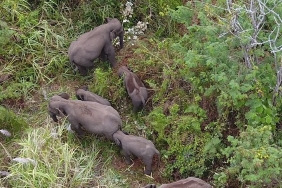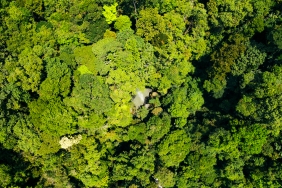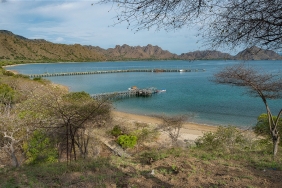WWF INDONESIA ORGANIZES EVALUATION OF KALIMANTAN ELEPHANT CONSERVATION STRATEGY AND ACTION PLAN (SRAK-GK) 2011-2017
By: Agus Suyitno
Tarakan (3/5/2017) - WWF Indonesia in collaboration with the Provincial Government of North Kalimantan organized a workshop on "Evaluation of Kalimantan Elephant Conservation Strategy & Action Plan (SRAK-GK) 2011-2017 and Plan for drafting SRAK-GK 2018-2028" in Tarakan.
The purpose of this evaluation is to see the extent of work achievements in the implementation of elephant conservation in Kalimantan and also see the problems or obstacles faced by the parties. The four aspects in the evaluation of SRAK-GK 2011-2017 include population and distribution management, habitat management, elephant conflict management, awareness raising and support of parties in Kalimantan Elephant conservation. Meanwhile, the plan to prepare the new SRAK-GK for the 2018-2028 period is to project the work plan that will be carried out for the next 10 years in Kalimantan Elephant conservation efforts.
A total of 36 participants attended the workshop, ranging from the Nunukan District Government Regional Apparatus Organization (OPD), North Kalimantan Provincial Government OPD, North Kalimantan Universities, local and national Non-Governmental Organizations (NGOs), plantation and forestry private sectors, elephant conflict handling task force members and the media.
The results of the evaluation of the SRAK-GK 2011-2017 targets show that about 84% of elephant habitat can still be maintained, while 16% is already in the designation of oil palm plantation development and residential areas. The total delineation of elephant habitat is 93,800 hectares in Tulin Onsoi District, Nunukan Regency which borders directly with Sabah, Malaysia.
In terms of population, the number of Borneo elephants can still be maintained, there is no population decline (elephant deaths) in nature due to hunting and other causes by human factors. The Borneo Elephant population is predicted to range from 20-80 individuals from the results of WWF Indonesia surveys in 2007 and 2012. Regarding the target of population increase, this is still uncertain, in the future surveys and monitoring are needed with more comprehensive methods to determine the amount of population increase that can be carried out by the parties.
In terms of human-elephant conflict, elephant conflicts still occur from year to year, elephants often eat oil palm plantations owned by companies and communities and other types of plants. The existence of an elephant conflict management task force team from the local community formed by the Nunukan Regency government since 2012/2013 has an important role in handling elephant conflicts with the community so that the risk of elephant conflict can be minimized.
In its 7-year journey towards the implementation of SRAK-GK 2011-2017, there are still many obstacles, 63% of the activities in the SRAK-GK 2011-2017 document have been carried out but around 37% of the activities still cannot be carried out. Judging from the role of the parties, it is recorded that about 50% have contributed to the implementation of SRAK-GK 2011-2017 but about 50% of the parties have not been able to contribute.
Agus Suyitno, Human-Elephant Conflict Mitigation Officer WWF Indonesia said, although the achievement of SRAK-GK 2011-2017 has not been maximized, we should appreciate the parties who have been involved in the implementation of SRAK-GK 2011-2017, both from the government, NGOs, the private sector, universities and the community who have contributed to the conservation efforts of Kalimantan Elephants. "In terms of targets, we have achieved although not maximized, the population and habitat of Borneo Elephants can still be saved," added Agus Suyitno. Currently, WWF Indonesia together with the parties are planning to develop a new SRAK-GK for the period 2018-2028. Some of the challenges in the next 10 years are:
1. Maintaining Bornean Elephant populations and key habitats; policy, protection, management and
law enforcement;
2. Surveys, monitoring of Borneo Elephant populations and habitats with the use of appropriate and comprehensive methods to determine the population and habitat quality of the Borneo Elephant; 2.
comprehensive methods to determine the population and habitat quality of the Borneo Elephant; 2.
3. Indonesia-Malaysia cross-border cooperation in Borneo Elephant conservation; 3.
4. Handling human-elephant conflict so that the risk of elephant conflict can be prevented or minimized; 4.
prevented or minimized; 4.
5. Involvement of stakeholders: government (local and central), NGOs, academics, private sector (forestry and 5.
plantation), elephant conflict handling task force and community in Borneo Elephant conservation; 6.
6. Economic improvement of communities in and around elephant habitat; 6.
7. Government budget support from the APBD & APBN funds and non-binding funds for conservation
Borneo Elephant.
In this workshop, the Regional Secretary of North Kalimantan Province Drs.H. Badrun, M.Si in his opening remarks said that the Borneo Elephant is a rare animal and needs to be preserved, its population is very limited. "The Borneo Elephant is a regional asset, in Kalimantan it is only found in the North Kalimantan region and this is also a matter of pride for us," he emphasized. It was also conveyed that the Regional Regulation on the Regional Spatial Plan (RTRW) of North Kalimantan Province was ratified on March 31, 2017, of course, it has accommodated the input of the parties that the habitat of the Borneo Elephant needs to be preserved, then it is welcome to follow up on the published regional regulations as future planning materials.





